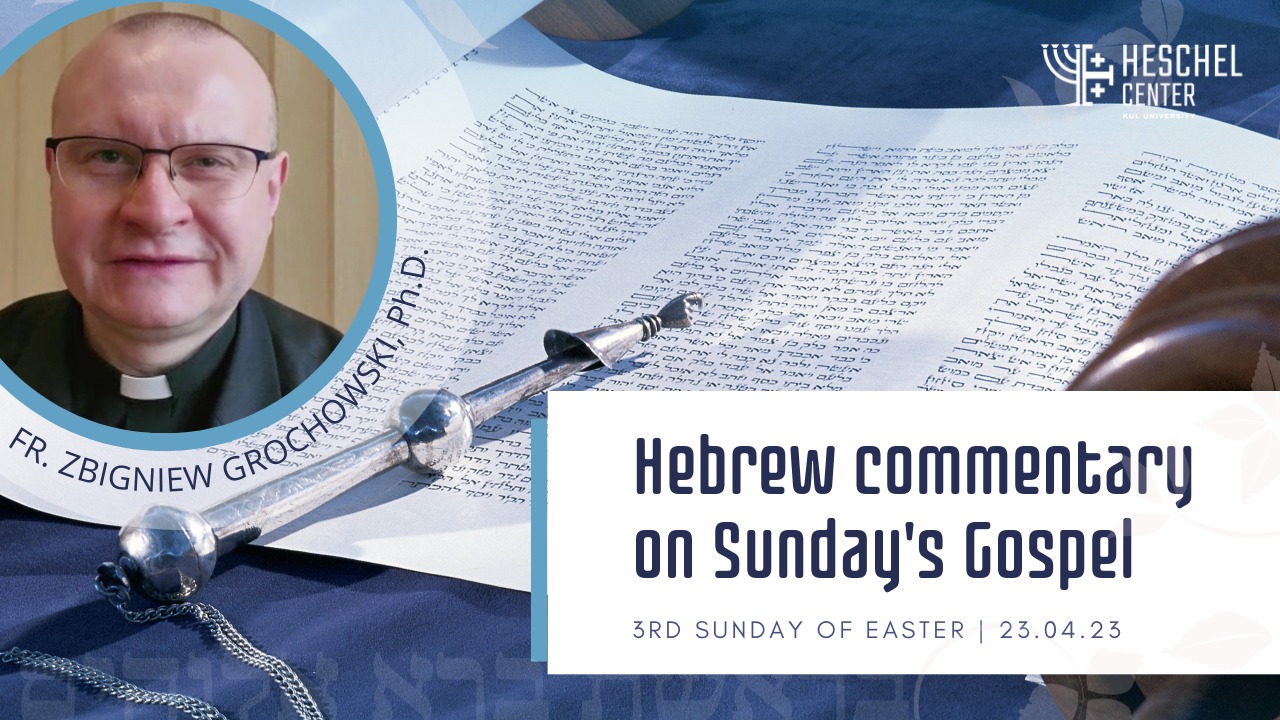Selective listening to Scripture – the mistake of the disciples at Emmaus


PhotoCredit_KUL Heschel Center
We must not repeat the mistakes of the disciples at Emmaus. We must read Scripture in its entirety and receive it in its entirety, not selectively, writes Fr. Zbigniew Grochowski, a Ph.D. in biblical sciences and archaeology, assistant professor in the Chair of New Testament Exegesis of the Department of Biblical Sciences of the Faculty of Theology of Cardinal Stefan Wyszynski University in Warsaw, in his commentary on the Gospel of Bible Sunday for the Heschel Centre at the Catholic University of Lublin.
The disciples heading to Emmaus, who meet Jesus on the way, were distressed, disappointed, and disillusioned. They had hoped the Messiah would be someone who would powerfully deliver the Israelites from Roman occupation. Jesus, however, had to correct their thinking, referring to texts and figures from the Old Testament who were particularly tied to His Passion.
The full text of the commentary follows:
The Risen Jesus appears in today’s verses of the Gospel to two disciples heading to Emmaus. They are distressed, disappointed, and disillusioned, because the Messiah was supposed to have restored Israel’s splendour, renewed the kingdom, liberated the Israelites from Roman occupation, and was to have revealed Himself as the Messiah. He was to be the kind of Messiah they had been waiting for, namely a mighty king, a victorious general who triumphs in battle, and a shepherd who safeguards the welfare of His flock.
Jesus has to correct this kind of thinking. Therefore, He refers to texts from the Old Testament that speak of the suffering of the Messiah, of the difficult moments: of His passion and death which must precede His glorification. Which texts Jesus refers to exactly is unknown to us, because Luke the Evangelist does not specify it. Possibly, Jesus had in mind the songs about the Servant of the Lord from the Prophets, especially the third and fourth songs. Possibly, he recalled the fate of the prophet Jeremiah, who suffered a lot and compared himself to a lamb that is led mute to the slaughter. Possibly, Jesus invoked the Psalms and the suffering of the righteous man present in so many of them. Possibly, He spoke about the Passover lamb from the Torah, from the Pentateuch, especially the Book of Exodus.
Possibly, also, Jesus had in mind various figures, not necessarily with messianic features, but undoubtedly a type of Jesus of Nazareth; Isaac offered as a sacrifice foreshadows the passion of Jesus. So does Joseph, sold by his brothers, or the righteous Job, put to a tremendous test.
If we were to go beyond the purely Hebrew tradition, Jesus may have referred to the Greek writings of the Old Testament, to Tobias or the Book of Wisdom and its various texts that address the suffering of the righteous one.
We must not make the mistake of the disciples heading to Emmaus and the other apostles. We need to read the Scriptures in their entirety, not selectively, not just the texts that are more convenient for us, which will show e.g. Jesus in all His glory. He also dies on the cross and suffers during His Passion. This is precisely our human life, the life of Jesus’ disciples. It is sometimes necessary to make a sacrifice. It is crucial, in the act of obedience to God, to be ready for various situations, including hardships, to preach the Gospel and sometimes to suffer because of it. This we must do so that we, too, can enter with our Saviour God’s glory of eternal life.
About the Author:
Fr. Zbigniew Grochowski – a Ph.D. in biblical sciences and archaeology, an alumnus of the Pontificium Institutum Biblicum in Rome and of the Studium Biblicum Franciscanum in Jerusalem, assistant professor in the Chair of New Testament Exegesis of the Department of Biblical Sciences of the Faculty of Theology of Cardinal Stefan Wyszynski University in Warsaw. A researcher of St. John’s texts and the subject of Jesus’ disciples, a lecturer at the Elbląg Seminary, an ordinary member of the Association of Polish Bible Scholars and of Ex-Alumni PIB.
God’s mercy inscribed on the pages of the Old Testament >>>
After his resurrection, why did Jesus first appear to women? >>>
Passover – the celebration of freedom and faith >>>
The more we know about Passover, the more we can understand the Last Supper >>>
Why did Jesus let Lazarus die? >>>
Who sinned, the blind man or his parents? >>>
How did the seventh man change the life of the Samaritan woman? >>>
Who was transfigured on Mount Tabor – the disciples or Jesus? >>>
The Desert – A Blessing or a Curse? >>>
KUL Heschel Center: Misunderstandings over the „eye for an eye” principle >>>
Law, Prophets, iota – we need to examine the context to understand the meaning of Jesus’ words >>>
Heschel Center KUL: What do salt, light and the city on a mountain mean to us? >>>
Heschel Center KUL: Why did the disciples, becoming „fishers of men,” abandon their nets? >>>
Hebrew Commentary to the Sunday Gospel excerpt – 2nd Sunday in Ordinary Time; Year A >>>
Jewish Commentary on the Gospel >>>
Hebrew commentary on the first Sunday of the New Year Gospel >>>
Jewish commentary on the Christmas Gospel >>>
Hebrew commentary on the Gospel for the Fourth Sunday of Advent >>>



Dodaj komentarz